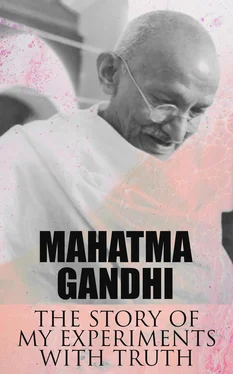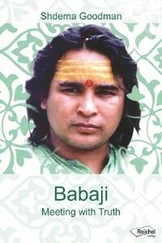An English passenger, taking kindly to me, drew me into conversation. He was older than I. He asked me what I ate, what I was, where I was going, why I was shy, and so on. He also advised me to come to table. He laughed at my insistence on abjuring meat, and said in a friendly way when we were in the Red Sea: ‘It is all very well so far but you will have to revise your decision in the Bay of Biscay. And it is so cold in England that one cannot possibly live there without meat.’
‘But I have heard that people can live there without eating meat,’ I said.
‘Rest assured it is a fib,’ said he. ‘No one, to my knowledge, lives there without being a meat-eater. Don’t you see that I am not asking you to take liquor, though I do so? But I do think you should eat meat, for you cannot live without it.’
‘I thank you for your kind advice, but I have solemnly promised to my mother not to touch meat, and therefore I cannot think of taking it. If it be found impossible to get on without it, I will far rather go back to India than eat meat in order to remain there.’
We entered the Bay of Biscay, but I did not begin to feel the need either of meat or liquor. I had been advised to collect certificates of my having abstained from meat, and I asked the English friend to give me one. He gladly gave it and I treasured it for some time. But when I saw later that one could get such a certificate in spite of being a meat-eater, it lost all its charm for me. If my word was not to be trusted, where was the use of possessing a certificate in the matter?
However, we reached Southampton, as far as I remember, on a Saturday. On the boat I had worn a black suit, the white flannel one, which my friends had got me, having been kept especially for wearing when I landed. I had thought that white clothes would suit me better when I stepped ashore, and therefore I did so in white flannels. Those were the last days of September, and I found I was the only person wearing such clothes. I left in charge of an agent of Grindlay and Co. all my kit, including the keys, seeing that many others had done the same and I must follow suit.
I had four notes of introduction: to Dr. P. J. Mehta, to Sjt. Dalpatram Shukla, to Prince Ranjitsinhji and to Dadabhai Naoroji. Someone on board had advised us to put up at the Victoria Hotel in London. Sjt. Mazmudar and I accordingly went there. The shame of being the only person in white clothes was already too much for me. And when at the Hotel I was told that I should not get my things from Grindlay’s the next day, it being a Sunday, I was exasperated.
Dr. Mehta, to whom I had wired from Southampton, called at about eight o‘clock the same evening. He gave me a hearty greeting. He smiled at my being in flannels. As we were talking, I casually picked up his top-hat, and trying to see how smooth it was, passed my hand over it the wrong way and disturbed the fur. Dr. Mehta looked somewhat angrily at what I was doing and stopped me. But the mischief had been done. The incident was a warning for the future. This was my first lesson in European etiquette, into the details of which Dr. Mehta humourously initiated me. ’Do not touch other people’s things,’ he said. ‘Do not ask questions as we usually do in India on first acquaintance; do not talk loudly; never address people as ‘sir’ whilst speaking to them as we do in India; only servants and subordinates address their masters that way.’ And so on and so forth. He also told me that it was very expensive to live in a hotel and recommended that I should live with a private family. We deferred consideration of the matter until Monday.
Sjt. Mazmudar and I found the hotel to be a trying affair. It was also very expensive. There was, however, a Sindhi fellow-passenger from Malta who had become friends with Sjt. Mazmudar, and as he was not a stranger to London, he offered to find rooms for us. We agreed, and on Monday, as soon as we got our baggage, we paid up our bills and went to the rooms rented for us by the Sindhi friend. I remember my hotel bill came to £ 3, an amount which shocked me. And I had practically starved in spite of this heavy bill! For I could relish nothing. When I did not like one thing, I asked for another, but had to pay for both just the same. The fact is that all this while I had depended on the provisions which I brought with me from Bombay.
I was very uneasy even in the new rooms. I would continually think of my home and country. My mother’s love always haunted me. At night the tears would stream down my cheeks, and home memories of all sorts made sleep out of the question. It was impossible to share my misery with anyone. And even if I could have done so, where was the use? I knew of nothing that would soothe me. Everything was strange—the people, their ways, and even their dwellings. I was a complete novice in the matter of English etiquette and continually had to be on my guard. There was the additional inconvenience of the vegetarian vow. Even the dishes that I could eat were tasteless and insipid. I thus found myself between Scylla and Charybdis. England I could not bear, but to return to India was not to be thought of. Now that I had come, I must finish the three years, said the inner voice.
Table of Contents
Dr. Mehta went on Monday to the Victoria Hotel expecting to find me there. He discovered that we had left, got our new address, and met me at our rooms. Through sheer folly I had managed to get ringworm on the boat. For washing and bathing we used to have sea-water, in which soap is not soluble. I, however, used soap, taking its use to be a sign of civilization, with the result that instead of cleaning the skin it made it greasy. This gave me ringworm. I showed it to Dr. Mehta, who told me to apply acetic acid. I remember how the burning acid made me cry. Dr. Mehta inspected my room and its appointments and shook his head in disapproval. ‘This place won’t do,’ he said. ‘We come to England not so much for the purpose of studies as for gaining experience of English life and customs. And for this you need to live with a family. But before you do so, I think you had better serve a period of apprenticeship with—. I will take you there.”
I gratefully accepted the suggestion and removed to the friend’s rooms. He was all kindness and attention. He treated me as his own brother, initiated me into English ways and manners, and accustomed me to talking the language. My food, however, became a serious question. I could not relish boiled vegetables cooked without salt or condiments. The landlady was at a loss to know what to prepare for me. We had oatmeal porridge for breakfast, which was fairly filling, but I always starved at lunch and dinner. The friend continually reasoned with me to eat meat, but I always pleaded my vow and then remained silent. Both for luncheon and dinner we had spinach and bread and jam too. I was a good eater and had a capacious stomach; but I was ashamed to ask for more than two or three slices of bread, as it did not seem correct to do so. Added to this, there was no milk either for lunch or dinner. The friend once got disgusted with this state of things, and said: ‘Had you been my own brother, I would have sent you packing. What is the value of a vow made before an illiterate mother, and in ignorance of conditions here? It is no vow at all. It would not be regarded as a vow in law. It is pure superstition to stick to such a promise And I tell you this persistence will not help you to gain anything here. You confess to having eaten and relished meat. You took it where it was absolutely unnecessary, and will not where it is quite essential. What a pity!’
But I was adamant.
Day in and day out the friend would argue, but I had an eternal negative to face him with. The more he argued, the more uncompromising I became. Daily I would pray for God’s protection and get it. Not that I had any idea of God. It was faith that was at work—faith of which the seed had been sown by the good nurse Rambha.
Читать дальше












